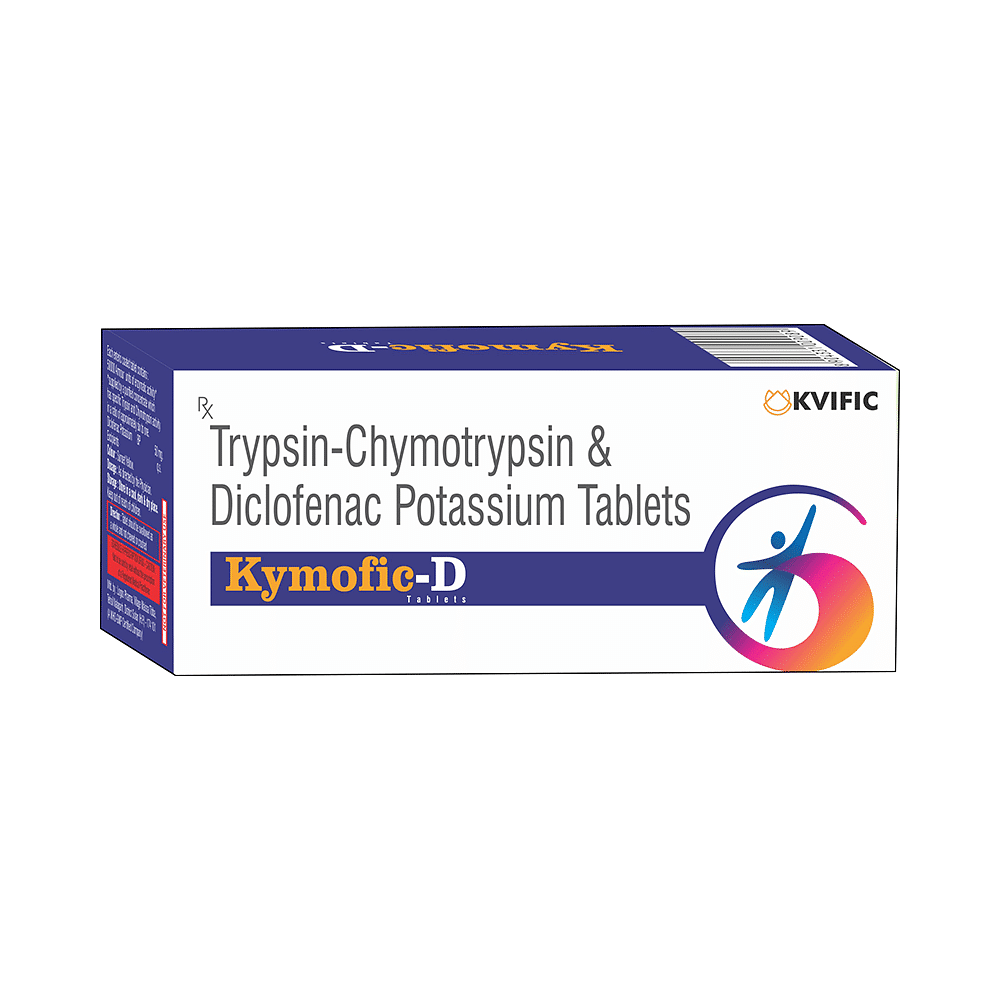
Hightril D 50mg/50000AU Tablet
Manufacturer
Genostic Pharma Private Limited
Salt Composition
Diclofenac (50mg) + Trypsin Chymotrypsin (000AU)
Key Information
Short Description
Hightril D 50mg/50000AU Tablet is a combination of two medicines used to relieve pain and inflammation in conditions like rheumatoid arthritis, ankylosing spondylitis, and osteoarthritis.
Dosage Form
Tablet
Introduction
Hightril D 50mg/50000AU Tablet is to be taken with food. This will prevent you from getting an upset stomach. The dose will depend on what you are taking it for and how well it helps your symptoms. You should take it as advised by your doctor. Do not take more or use it for longer duration than recommended by the doctor.
Directions for Use
Take this medicine in the dose and duration as advised by your doctor. Swallow it as a whole. Do not chew, crush or break it. Hightril D 50mg/50000AU Tablet is to be taken with food.
How it works
Hightril D 50mg/50000AU Tablet is a combination of two medicines: Diclofenac and Trypsin Chymotrypsin which relieve pain and inflammation. Diclofenac is a non-steroidal anti-inflammatory drug (NSAID) which works by blocking the release of certain chemical messengers in the brain that are responsible for pain, fever and inflammation. Trypsin Chymotrypsin is a combination of enzymes which break down proteins into smaller fragments, thereby making them available for absorption into the blood. Once absorbed, they increase blood supply in the affected area and reduce swelling.
Quick Tips
Take it with food to help prevent an upset stomach. Take it as per the dose and duration prescribed by your doctor. Long term use may lead to serious side effects. It may cause dizziness, drowsiness or visual disturbances. Use caution while driving or doing anything that requires concentration. Avoid consuming alcohol while taking this medicine as it can cause excessive drowsiness and increase your risk of stomach problems. Inform your doctor if you have a history of heart disease, stroke, liver or kidney disease or problems with your blood clotting mechanism.
Related Medicines

Trypep D 50mg/50000AU Tablet

Tryple D 50mg/50000AU Tablet

Chymin Plus Tablet

Chymowin Plus Tablet

Chymover-Plus Tablet

Onatrip K 50mg/50000AU Tablet

Chymotis-D Tablet

Trape D 50mg Tablet

Oltrypsin D 50mg Tablet

Kymofic-D Tablet
Frequently asked questions
Taking a higher than recommended dosage of Hightril D 50mg/50000AU Tablet will be more effective?
No, taking a higher than the recommended dose may not be more effective and may increase the likelihood of serious side effects. Consult your doctor if you experience increased symptoms that are not relieved by the recommended dosage.
Are there any specific contraindications associated with the use of Hightril D 50mg/50000AU Tablet?
Patients with known allergies to any component or excipient of this medicine should avoid its use. It should also be avoided in patients with a history of stomach ulcers, active or recurrent stomach ulcer / bleeding, heart failure, high blood pressure, and liver or kidney disease.
Does Hightril D 50mg/50000AU Tablet expire?
Yes, Hightril D 50mg/50000AU Tablet does expire. Please check the expiry date on the package for this medicine.
What is Hightril D 50mg/50000AU Tablet?
Hightril D 50mg/50000AU Tablet is a combination of three medicines: Diclofenac, Trypsin and Chymotrypsin. This medicine helps decrease pain and swelling by lowering chemical substances in the body that cause pain and swelling.
Can I get addicted to Hightril D 50mg/50000AU Tablet?
No, there are no reports of patients becoming addicted to Hightril D 50mg/50000AU Tablet.
Can I stop taking Hightril D 50mg/50000AU Tablet when my pain is relieved?
Hightril D 50mg/50000AU Tablet is usually used for short-term and can be discontinued when your pain is relieved. However, it should be continued if advised by your doctor.
Can the use of Hightril D 50mg/50000AU Tablet cause dizziness?
Yes, the use of Hightril D 50mg/50000AU Tablet can cause dizziness (feeling faint, weak, unsteady or lightheaded) in some patients. If you experience dizziness, stop what you are doing and sit or lie down for a while until you feel better. Do not drive or use machines.
Can the use of Hightril D 50mg/50000AU Tablet cause damage to kidneys?
Yes, long-term use of Hightril D 50mg/50000AU Tablet can cause damage to the kidneys. Prostaglandins protect the kidneys from damage. The use of painkillers lowers prostaglandin levels in the body leading to kidney damage on long-term use. Painkiller use is not recommended for patients with pre-existing kidney diseases.
How long will Hightril D 50mg/50000AU Tablet take to act?
It may take about an hour to notice the initial pain relief after taking Hightril D 50mg/50000AU Tablet.
What if I forget to take Hightril D 50mg/50000AU Tablet?
If you forget to take the scheduled dose of Hightril D 50mg/50000AU Tablet and it is almost time for your next dose, skip the missed dose and take your next dose at the scheduled time. Otherwise, take it as soon as you remember. Do not take a double dose to make up for the missed dose because this may increase the risk of unwanted side effects due to overdose. Consult your doctor if you are unsure what to do.


